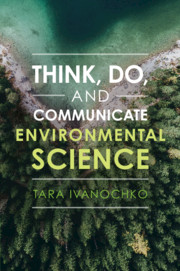Book contents
- Think, Do, and Communicate Environmental Science
- Think, Do, and Communicate Environmental Science
- Copyright page
- Contents
- Prologue
- Acknowledgements
- Introduction
- Part I Thinking Environmental Science
- Part II Doing Environmental Science
- Chapter 5
- Chapter 6
- Chapter 7
- Chapter 8
- Chapter 9
- Chapter 10
- Chapter 11
- Chapter 12
- Part III Communicating Environmental Science
- Epilogue
- Appendix: Working in Excel
- Glossary
- Index
- References
Chapter 5
from Part II - Doing Environmental Science
Published online by Cambridge University Press: 23 April 2021
- Think, Do, and Communicate Environmental Science
- Think, Do, and Communicate Environmental Science
- Copyright page
- Contents
- Prologue
- Acknowledgements
- Introduction
- Part I Thinking Environmental Science
- Part II Doing Environmental Science
- Chapter 5
- Chapter 6
- Chapter 7
- Chapter 8
- Chapter 9
- Chapter 10
- Chapter 11
- Chapter 12
- Part III Communicating Environmental Science
- Epilogue
- Appendix: Working in Excel
- Glossary
- Index
- References
Summary
A good scientific question will motivate a good research project. The process of asking questions and gaining knowledge is iterative. Asking a question directs an action: an investigation into what has been done in this field before and what is already known about this problem. Sometimes the answer to your question can be found in the published scientific literature. If that is the case, you can refine your question. Answering a question generates new knowledge, which in turn generates new questions, and so on. So your questions will become clearer and more useful as you gain information, resources, and experience in your field. Be prepared to review your research questions regularly. They may need to change over time.
- Type
- Chapter
- Information
- Think, Do, and Communicate Environmental Science , pp. 63 - 73Publisher: Cambridge University PressPrint publication year: 2021

